Adobe
Adobe is one of the oldest building materials in use. It is basically just dirt that has been moistened with water, sometimes with chopped straw or other fibers added for strength, and then allowed to dry in the desired shape. Commonly adobe is shaped into uniform blocks that can be stacked like bricks to form walls, but it can also be simply piled up over time to create a structure. The best adobe soil will have between 15% and 30% clay in it to bind the material together, with the rest being mostly sand or larger aggregate. Too much clay will shrink and crack excessively; too little will allow fragmentation. Sometimes adobe is stabilized with a small amount of cement or asphalt emulsion added to keep it intact where it will be subject to excessive weather. Adobe blocks can be formed either by pouring it into molds and allowing it to dry, or it can pressed into blocks with a hydraulic or leverage press. Adobe can also be used for floors that have resilience and beauty, colored with a thin slip of clay and polished with natural oil.
Adobe buildings that have substantial eaves to protect the walls and foundations to keep the adobe off the ground will require less maintenance than if the walls are left unprotected. Some adobe buildings have been plastered with Portland cement on the outside in an attempt to protect the adobe, but this practice has led to failures when moisture finds a way through a crack in the cement and then can't readily evaporate. When adobe is used as an exterior plaster it is either stabilized or replastered on a regular basis.
Adobe is a good thermal mass material, holding heat and cool well. It does not insulate very well, so walls made of adobe need some means of providing insulation to maintain comfort in the building. Sometimes this is accomplished by creating a double wall, with an air space, or some other insulation in between. Another approach is placing insulating materials on the outside.
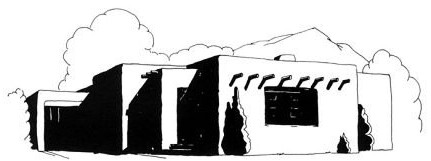
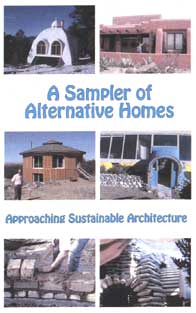 A Sampler of Alternative Homes: Approaching Sustainable Architecture. This two-hour DVD, produced by Kelly Hart, provides an overview of sustainable building concepts. You can enjoy a look at a fascinating variety of homes and the creative people who built them! Discover how passive solar design and environmentally low-impact materials can be used to create comfortable and economical homes. See the use of both traditional materials, such as adobe, and innovative materials, such as papercrete and earthbags.
A Sampler of Alternative Homes: Approaching Sustainable Architecture. This two-hour DVD, produced by Kelly Hart, provides an overview of sustainable building concepts. You can enjoy a look at a fascinating variety of homes and the creative people who built them! Discover how passive solar design and environmentally low-impact materials can be used to create comfortable and economical homes. See the use of both traditional materials, such as adobe, and innovative materials, such as papercrete and earthbags.
This program offers a wealth of information about construction details and other considerations. It covers adobe block construction, piled adobe (similar to cob), rammed earth, both load-bearing and post and beam strawbale, earthships, earth-sheltering, cordwood, thin-shelled concrete domes, papercrete, earthbags, hybrid structures, and recycling various containers for housing. 
The books shown below are arranged according to when they were published, with the most recent ones at the top. If you click on one of the images you will be taken to a page at Amazon.com where you can find out more about the book. If you end up buying one of them, greenhomebuilding.com will receive a small commission that will help cover the cost of maintaining this website. Thanks for your patronage.



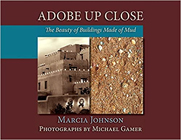
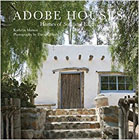
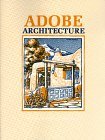
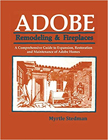
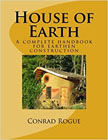
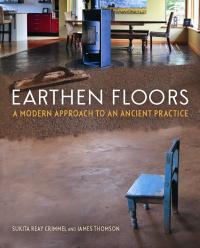
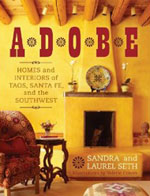
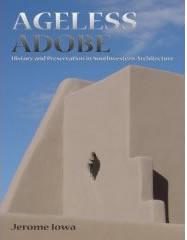
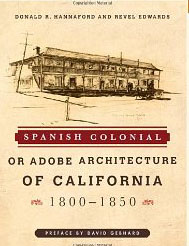
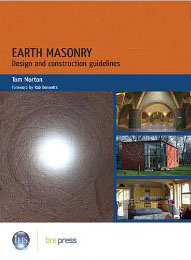
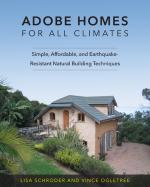
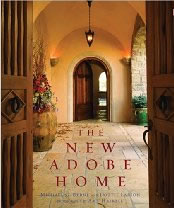
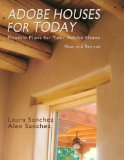
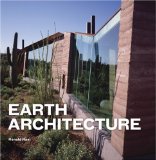
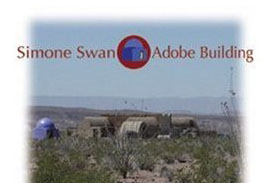
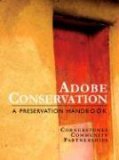
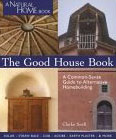

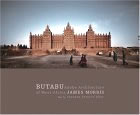
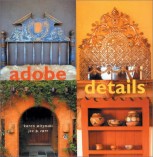

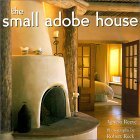
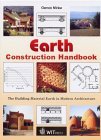
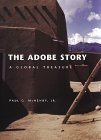
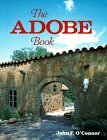
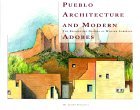
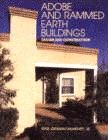
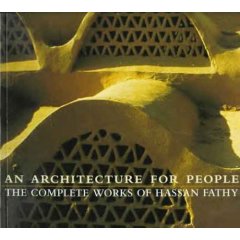
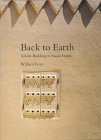
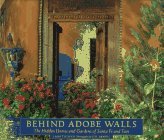
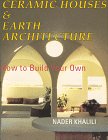
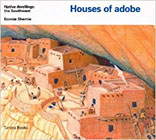
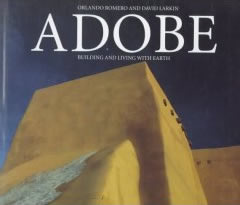
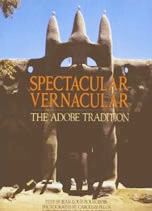

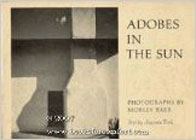
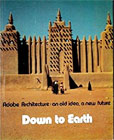
Plans
Santa Fe I
Sven Alstrom , Designer
This one story Santa Fe Style ranch home has an attached two car garage and is based upon 24 inch wide straw bale (or adobe) construction on a concrete block foundation & concrete spread footings with crawl spaces and a partial basement. Though not designed as a passive solar house, it is designed for primarily hot weather climates. Natural interior plaster and natural exterior stucco are recommended. The interior square footage of the house portion is 2,336 square feet, measured on the inside of walls. In addition, the garage has 20 x 22 ft. clear inside dimensions. This home was originally designed for the main entrance to face east so that the kitchen is southeast for ‘ayurvedic' benefits – the plan also works well with the garage on the north side or by ‘flipping' the plan with the bedrooms on the south.
For more information about this plan, and many others, visit our sister site www.dreamgreenhomes.com, where you will find a wide range of plans for sustainable homes, greenhouses, small buildings, garages, and food storage space for sale. Dream Green Homes is a consortium of outstanding architects and designers, who have pooled their talent and expertise for your benefit.
Informative Links
adobebuilder.com Adobe Builder Magazine offers media, classes and information about adobe and rammed earth.
adobealliance.org Simone Swan's Adobe Alliance promotes earthen architecture, especially
that inspired by the work of Hassan Fathy, through information and workshops.
naturalhomes.org lists workshops from around the world, some of them related to adobe building.
earth-auroville.com Auroville in India has been working with various aspects of earthen architecture and has much to share.
eartharchitecture.org features information and sponsors workshops on all types of earth building.
davidsheen.com features a wonderful collection of pictures of earthen sturctures from around the world. (If Firefox doesn't work, try another browser.)
coloradoearth.com has information about Compressed Earth Blocks and services realated to these.
terrabuilt.com manufacturer of a compressed earthen brick machine that has a key/lock system eliminating the need for mortar.
adobebuilding.com describes a unique system for molding stabilized adobe bricks...they also occasionally sponsor workshops.
lavoutenubienne.org describes an African adaptation of adobe vaulted roof structures.
velacreations.com instructions for making stabilized compressed earth block floors.
jinriki.blogspot.com How to make a traditional Japanese tamped earth floor.
docs.google.com is an Interlocking Soil/Cement Compressed Earth Block Feasibility Study
facebook.com/PuebloProject describes how adobe building in Nicaragua empowers women.
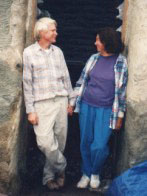
For Email contact go to About Us
Established in 2001, GreenHomeBuilding.com is primarily a labor of love. Kelly, and the GreenHomeBuilding team of experts, have answered thousands of questions for readers over the years, and we continue to publish up-to-date information about increasingly important sustainable architecture. If you feel moved to assist us in this work, your kind donation would be much appreciated; this can be easily done through our PayPal account:

VISIT OUR OTHER WEBSITES:
[Natural Building Blog] [Earthbag Building] [Dream Green Homes]
Disclaimer Of Liability And Warranty
I specifically disclaim any warranty, either expressed or implied, concerning the information on these pages. Neither I nor any of the advisor/consultants associated with this site will have liability for loss, damage, or injury, resulting from the use of any information found on this, or any other page at this site. Kelly Hart, Hartworks LLC.


